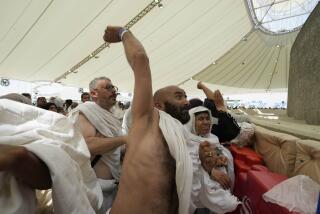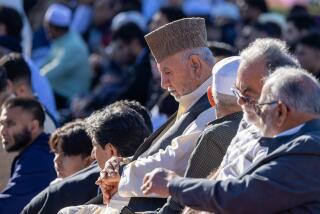A Ramadan Tradition
- Share via
The first year the Adaya family prayed at home every night during the Muslim holy month of Ramadan, they considered closing the drapes. The window that faced the street made it possible for passersby to see the family bowing, kneeling, pressing their foreheads to the floor, the women wearing head scarves and long dresses.
Twenty family members--husbands, wives, children, parents and grandparents--in prayer, with the men in front separated from the women in back, was not what the neighbors expected to see. The previous owner of the house was a variety-show choreographer who used the room as a dance studio.
But the Adayas decided to keep the drapes open. Ten years later, Muslim neighbors are now part of the prayer group; so are family friends and new generations of children. As many as 200 people crowd into the room during the last nights of Ramadan, when everyone tends to double their efforts; this year, it ends Jan. 7.
None of this was planned. “I didn’t raise my children to be devout,” said Ahmad Adaya, 72, who was raised in Pakistan and now lives in Santa Monica and works as a real estate developer. He raised five daughters and a son without using the word “religion,” as he remembers it. “I didn’t impose anything on them, but they have become less materialistic, more spiritual over time,” he said.
During Ramadan, L.A. County’s estimated 200,000 Muslims observe many of their religious rituals at home and pray five times each day, wherever they may be. But only the most devout spend two hours every night during the month, after fasting from food and drink all day, reading the Koran’s 600 pages. The practice commemorates the 30 days when Muhammad, the 7th century Arab prophet who founded Islam, wrote down the entire book from divine dictation.
“Off and on, we had family prayer at home,” Adaya said. “Finally, I thought to myself, ‘Why not every night for the most auspicious celebration of the year?’ ” He got the idea after one of his daughters came home from the gas station with a story to tell. She noticed that the attendant was standing off to the side reciting prayers on his prayer rug.
It turned out that he was an imam, a prayer leader who could recite the entire Koran from memory. Hashem Almahdi, now 35 and a pathologist working in Los Angeles, was asked to lead the family’s prayer gatherings. He began studying the Koran as a 13-year-old living in Syria. He came to the U.S. after high school. “I’m not a smart person or bright,” he said recently. “It is God’s gift.”
He spent five years memorizing, then passed exams at which his teachers spoke one line from anywhere in the Koran and Almahdi had to go on from there. The last step was to learn correct tone and inflection because the Koranic verses are said in the original Arabic, which is not Almahdi’s native language.
As the group of about 40 gathers in the dance studio-turned-prayer room, Almahdi, dressed in black robe and white embroidered cap, sits on the floor with his back to the room. The men, with the Koran on their laps, sit behind him, some holding their children. Behind them sit the women. Children move freely about the room, climbing in and out of laps, playing quietly with each other.
As Almahdi recited Surah, or sections three and four in the book dealing with marriage, divorce and raising children, the men sitting close to him quietly corrected any mistakes. “Every word must be perfect,” Almahdi later explained. “People carry the Koran in case I get stuck or forget. To keep the words alive in my chest, I rehearse continuously.” Driving to work is his best practice time.
Fasting and abstaining from sexual activity during daylight hours as well as making charitable donations and reciting the five daily prayers are part of keeping Ramadan. To read the Koran for close to two hours each evening is not expected. Some family members stayed for just part of the recitation.
Omar Haroon, 23, one of Adaya’s grandsons, started observing the fast and taking part in the family’s nightly prayers the first year Adaya invited all his children. “It’s not required; it’s more like extra credit,” said Haroon, a senior at UCLA. “The first year it was a required thing. . . . Now, I go when I have time, but it is more meaningful for me.”
Haroon was one of the first in the family to be tutored by Almahdi, who takes students free of charge. They start with a certain chapter of the Koran they particularly like and go slowly from there, he said.
“It was very embarrassing,” Adaya recalled of the first year Almahdi led Ramadan prayers at his house. “I gave him an envelope to take home and open. The next morning he came to my house weeping and crying. He said, ‘Take the money back or I’ll never come to your house again.’ After that, I tried to adopt him and see that he got married. But his parents in Damascus had already chosen a wife for him.” Almahdi now has three young children.
After the recitation one recent night, people made petitions for friends. “Please,” a man asked, “lead a fatwa [a proclamation, in this case, of prayers] for one of the brothers [a fellow Muslim]--he’s been in a coma for two months.” And Almahdi gave a brief sermon that did not touch on any of the more complicated moral strictures named in the verses he recited that night. “Do what you are supposed to do, then put your trust in Allah,” he said.
“It’s a very difficult month for Muslims,” said Jane I. Smith, author of “Islam in America” (Columbia University Press, 1999). “It is grueling to go all day without food or water. You look for occasions to reaffirm the importance of what you are doing. It’s just not appropriate to analyze the text at that time.” The Koran, like the Bible, is continuously reinterpreted by scholars as well as armchair experts in classroom situations.
The long, arduous prayer session over, the Adayas filled tables on the patio with dates, persimmons, French rolls and a hearty lentil soup. They began to eat again slowly, sipping tea and taking only small bites of their food. But soon, the mood turned livelier as people got their energy back.
“You want material and spiritual nourishment during Ramadan,” Smith said. “Breaking of the fast should be done communally. Islam is an act of submission and submitting, together.”
Mary Rourke can be reached by e-mail at mary.rourke@latimes.com.
More to Read
Sign up for Essential California
The most important California stories and recommendations in your inbox every morning.
You may occasionally receive promotional content from the Los Angeles Times.













